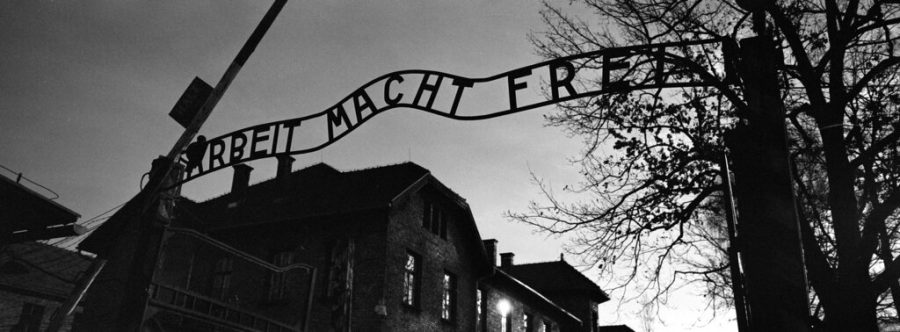EDITORIAL: We’re forgetting to “Never Forget”
The main entrance at the former Nazi death camp of Auschwitz in Oswiecim, Poland, with the inscription, ‘Arbeit Macht Frei’, which translates into English as ‘”Work will set you Free”, Sunday, Dec. 8, 2019. On Jan. 27, 1945, the Soviet Red Army liberated the Auschwitz death camp in German-occupied Poland. Auschwitz was the largest of the Germans’ extermination and death camps and has become a symbol for the terror of the Holocaust. On Monday — 75 years after its liberation — hundreds of survivors from across the world will come back to visit Auschwitz for the official anniversary commemorations. In advance of that, Associated Press photographer Markus Schreiber visited the site. Using a panoramic camera with analog film, he documented the remains of the camp in a series of haunting black and white photos. (AP Photo/Markus Schreiber)
It’s December 1942.
A cattle car is slowly winding to a stop, lightly tapping the end of a railroad track in front of one of the most notorious places on Earth.
European Jews spill out of the cattle car, many getting their first glance at what will soon become their final resting place.
Without even mentioning the name, I would assume the vast majority of Americans know exactly where that cattle car stopped. I would be wrong.
Earlier this week, I stumbled upon a deeply upsetting nationwide survey conducted by The Conference on Jewish Material Claims Against Germany, or Claims Conference (CC). The CC’s survey was branded as “the first-ever 50-state survey on Holocaust knowledge among Millennials and Gen Z.”
The survey was randomly conducted with approximately 11,000 individuals – 200 from each state – between the ages of 18-39. It was meant to get a general sense of how much, or little, Millennials and Gen Z know about the Holocaust. The results are appalling.
63% of respondents didn’t know that 6 million Jews died in the Holocaust. In fact, 36% thought it was less than 2 million. 48% couldn’t name a concentration camp. 40% couldn’t even name what war the Holocaust was associated with (22% thought WWI, 10% weren’t sure, 5% thought the Civil War, and 3% thought the Vietnam War).
Pennsylvania’s numbers weren’t any better; 59% didn’t know 6 million Jews were killed, 33% believed it was less than 2 million, and 40% of survey respondents did not know what Auschwitz was.
We promised to never forget. We are failing.
With World War II having ended 75 years ago, there are incredibly few Holocaust survivors left. Vital information, stories, and ties to the Holocaust will soon be gone. Generation Z has a moral obligation to honor these survivors and the millions who were executed. We can not continue the dangerous patterns shown in this survey and allow us to collectively forget what happened to the Jewish community and the world in the 1940s.
If more and more of us forget, then, as shown through the survey results, Naziism and Holocaust denial will run rampant. 49% said they’ve seen Holocast denial on social media, and at least 44% in every state reported seeing Nazi symbols in their community or online in the past 5 years.
As former director of the United States Holocaust Memorial Museum Walter Reich laid out in his piece marking the 75th anniversary of the liberation of Auschwitz, “anti-Semitism has returned, in part, because the general public’s knowledge about the Holocaust—of what exactly it was, who exactly was murdered in it, how many were killed, and how anti-Semitism spawned it—has diminished.”
If such large percentages of people are uneducated about the Holocaust, then there will be an alarming scarcity of those who are knowledgeable enough to speak out and correct those who perpetrate lies denying the reality of Hitler’s orchestrated executions.
As Reich reflects on the rise of anti-semitism so soon after the end of the Holocaust, he wonders “Could “never again,” vowed so solemnly and so repeatedly after the Holocaust, revert to “yet again”?
I’m not asking everyone to become a Holocaust expert, just to educate yourselves and know the very basics of what happened, so “yet again” never becomes a reality.
Go read “Night” by Holocaust Survivor and Nobel Peace Prize winner Elie Wiesel.
See the alarming rise of antisemitism here.
Learn something by visiting the United States Holocaust Memorial Museum.
Listen to the survivors.
Never forget.



Catherine • Sep 23, 2020 at 1:46 pm
This is a beautiful article. The point was conveyed perfectly, and you never cease to amaze me. We should all take some time to reflect on national and global history. Keep up the good work. You’re becoming a great journalist.
Sanaa Beaufort • Sep 22, 2020 at 8:51 am
can you please do an article about injustice racism or BLM or even black history. something.
adviser • Sep 22, 2020 at 11:40 am
Sanaa
Thanks for posting a comment.
We are just getting up and running for the new school year, but I am sure one of our staff writers will tackle this important topic very soon.